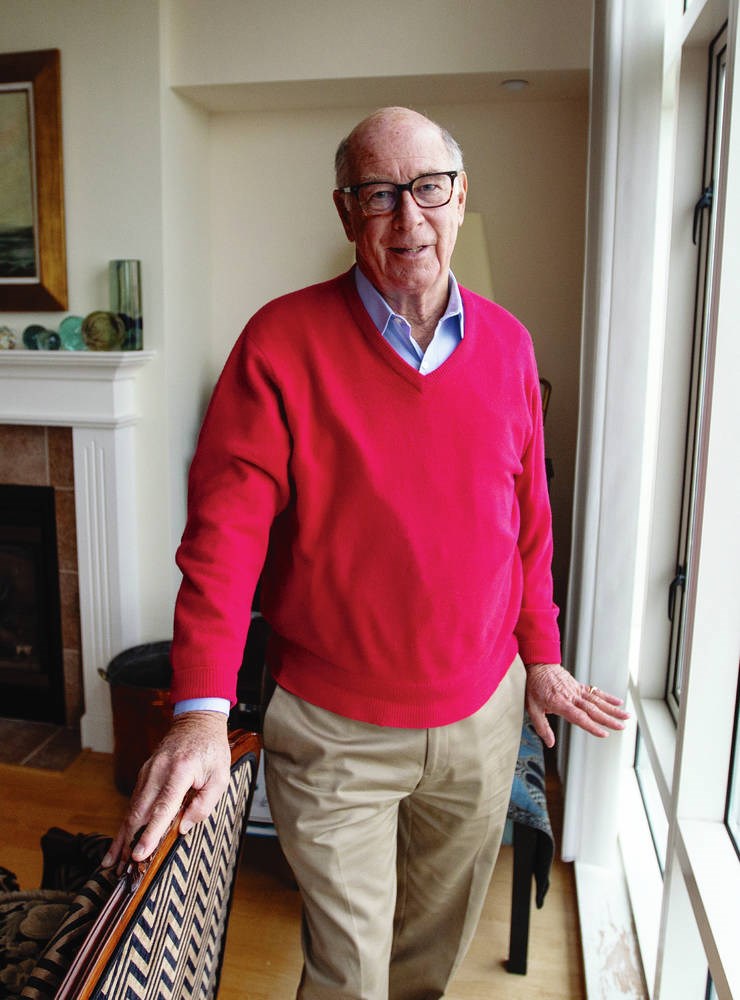COVID-19 took Gordon Viberg by surprise, just as it has for so many others.
“When I planned to celebrate my 75th birthday with a ski trip, I never imagined that soon afterward I would be diagnosed with COVID-19 and pneumonia,” he said. “Or that I would be fighting for my life in the hospital.
“My doctors tell me I’m lucky to be alive.”
Viberg’s journey started in March, when the COVID-19 pandemic was just ramping up. He had just returned to the city from his ski trip to Aspen and followed directions from public-health officials to self-isolate.
Ten days into that process, he developed what seemed to be a sinus cold, followed by a terrible headache. Then came a temperature spike to more than 40 C, along with delirium. His wife, Dale, a retired registered nurse, called the family’s physician, Dr. Jill Norris.
Norris said to call 911.
The next thing Viberg remembers is waking up in the Royal Jubilee Hospital Intensive Care Unit with a diagnosis of COVID‑19. He was in critical condition.
Viberg is sharing his story as the Victoria Hospitals Foundation stages the It’s Critical Campaign, which aims to raise $7 million to expand critical-care capacity at Royal Jubilee Hospital, helping to keep vital ICU beds free for the most seriously ill.
It hopes to create a high acuity unit — a step down from the ICU — that can keep pressure off ICU beds.
Viberg said he needed the ICU at least for the first part of his stay, when there was great concern about his breathing.
“I was so weak that I couldn’t get out of bed,” he said. “Despite the discomfort, I was determined to think positively and get home to my family.”
Viberg ended up in the ICU for 12 days, which he called “incredibly lonely and isolating” because his wife and son couldn’t visit.
He said the ICU staff kept him calm.
“They gave me comfort even though I’m sure they were under tremendous stress,” Viberg said. “When I was stable enough to leave the ICU, the care-team members and staff lined up in the hallway applauding. They were so happy and relieved. It was a powerful moment.”
He said he has spent 40 years outside Canada, and the health care in Victoria is the best anywhere. “I never imagined having to spend time in critical care, but I’m so grateful I was in Victoria when I needed it. Thanks to our hospitals, I have no lasting effects or health issues. I’m back to playing tennis daily. I feel 100 per cent, but I know that my story could have ended quite differently.”
Viberg said he made a recent donation to the Victoria Hospitals Foundation and the It’s Critical Campaign because he has first-hand knowledge of its importance.
Dr. Grant McIntyre, the medical lead and division head for south Island ICUs, said Viberg ended up being the fifth COVID‑19 patient at Royal Jubilee. “Nobody ever wants to be in a critical-care environment, but when you’re dealing with a life-threatening illness and you’re critically ill, it’s the safest place to be,” McIntyre said. “It’s often your best chance at survival.”
He said an interim high-acuity unit is already in place, thanks to donors.
“Not only do we have more capacity, we have a new safe place where patients can be monitored and receive more intensive nursing,” McIntyre said. “I’m thankful for the donors who supported this critical-care equipment and those who will step forward to help build the permanent HAU. It will help save lives. For years to come, it will help us care for patients like Gordon as they battle severe illness.”
The campaign has already reached an interim goal of $1 million for urgently needed critical care equipment in response to COVID-19. That includes eight new patient monitors and a central-monitoring station.
Donations to the It’s Critical Campaign can be made online at victoriahf.ca. The public can also call 250-519-1750 or email VHF@viha.ca.
jwbell@timescolonist.com



